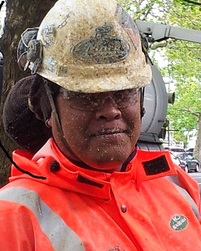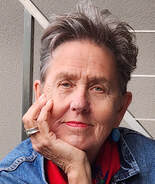There have been men at work everywhere this week. On frigid mornings, on wet and miserable days, they’ve been out there, in hi-viz jackets and hard hats, shifting mounds of sodden earth with diggers and bulldozers, clambering into water-filled trenches, setting up road cones and directing traffic to keep the rest of us safe.
 Mud-spattered road worker in Auckland
Mud-spattered road worker in Auckland We women worked, ferrying the lighter items - chairs, pictures, domestic appliances, mats, and books - while the men portered the heavy and awkward items.
Most remarkably, they moved a beautiful but hulking Indian cabinet over two metres high. It took the combined strength, ingenuity, and teamwork of four of them to coax and nudge and drag the thing through one doorway, down a set of steps, up the road for a hundred metres, then up another set of steps and through two more doorways before restoring it to an upright position in its new home.
But it wasn't poetry in motion: it was struggle and effort, pauses for breath and a better grip, grunts, groans, joking and laughs and a few bum-cracks on display. This is what many men’s work is like: hard physical yakka in uncomfortable or challenging conditions, dependent on hard-won experience, technique, and teamwork. Often, it’s also risky: if the cabinet had toppled over it could have hurt someone quite badly, a wrenched back or grazed knuckles almost a certainty.
This was not the first time that I’ve noticed men at work lately. There seem to have been men at work everywhere I look - gangs of them, laying cable or fixing pipes all over Nelson. On frigid mornings, on wet and miserable days, they've been out there, in hi-viz jackets and hard hats, shifting mounds of sodden earth with diggers and bulldozers, clambering into water-filled trenches, setting up road cones and directing traffic to keep the rest of us safe. I've noticed men at the top of telegraph poles. I've noticed them clambering high up on scaffolding or rooftops. I've noticed them at smoko, sitting mud-spattered on the roadside, backs to a cold wind, drinking tea from a flask with only more dirty, heavy labour ahead of them.
On TV, I've seen men at work in abattoirs, slicing open the bellies of sheep and cattle with treacherously sharp knives. Not shown on TV - it would be too disturbing - are the men who deliver the deathblow to animal after animal each day, slitting throats and cutting off heads. Also unseen, are the men working at claustrophobic depths underground, mining and tunneling. Or the men out in the bush precision-felling gigantic trees and dragging them out with chain and winch. I've even found myself marveling at the courage of a rugby player (just another worker these days) who has to throw himself back into scrum or tackle after a recently broken jaw or collarbone.
In New Zealand it is still men who do most of the dangerous jobs. Their tools are dangerous –chainsaws, axes, knives and heavy machinery. They do work which breaks bones and minces fingers, maims and mangles and crushes. Their rate of workplace injury exceeds that of women many times over and New Zealand’s rate of workplace death and injury is twice that of Australia, three times that of Britain, and worse than all of the six other developed countries.
I've been wondering if it’s only by suppressing their feelings and giving free rein to the adrenaline and testosterone in their systems that men are able to bear the dirty work we ask of them. Could it be that this is also why they are generally more drawn to high-risk activities and are more prone to violence? It makes for a potent brew when combined with a dash of misogyny.
Most women encounter casual misogyny on an everyday basis. It’s in the air that they breathe. However, the wry conversations women have with each other don’t usually centre on this everyday offensiveness. They are more likely to focus on the seemingly unbridgeable divide between male and female sensibilities, or marvel at the hopeless mismatch between male and female approaches to life.
John Gray, author of one of the better-known books on male/female relationships, suggests that men and women are as strange to each other as the inhabitants of two different planets. “Men are from Mars” he claims and “Women are from Venus”. Men certainly do seem like aliens to women (and probably to many men as well) when we hear news of another man who has killed his wife, imprisoned women and girls in a basement dungeon or has shot dozens of colleagues or schoolmates. Not all men are violent, and men are more often the victims of violence than women. But the fact remains that domestic violence is one of the leading causes of injury and death to women in N.Z. and 84% of those arrested for domestic violence are men. Statistics like these make it easy to believe that men do indeed, come from Mars, the planet named after the Roman god of war.
But today, I want to remember and praise the men amongst us who are like the men I observed this week helping each other lug a cumbersome Indian cabinet from one home to another. Let’s remember the men in our midst who are just like them: strong, decent, good-natured, and hardworking.
 RSS Feed
RSS Feed

